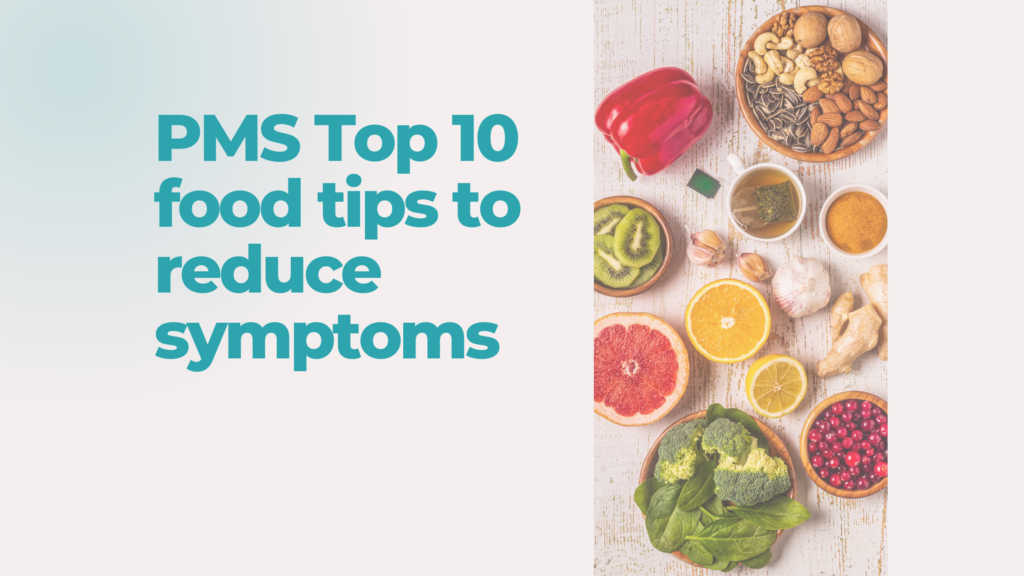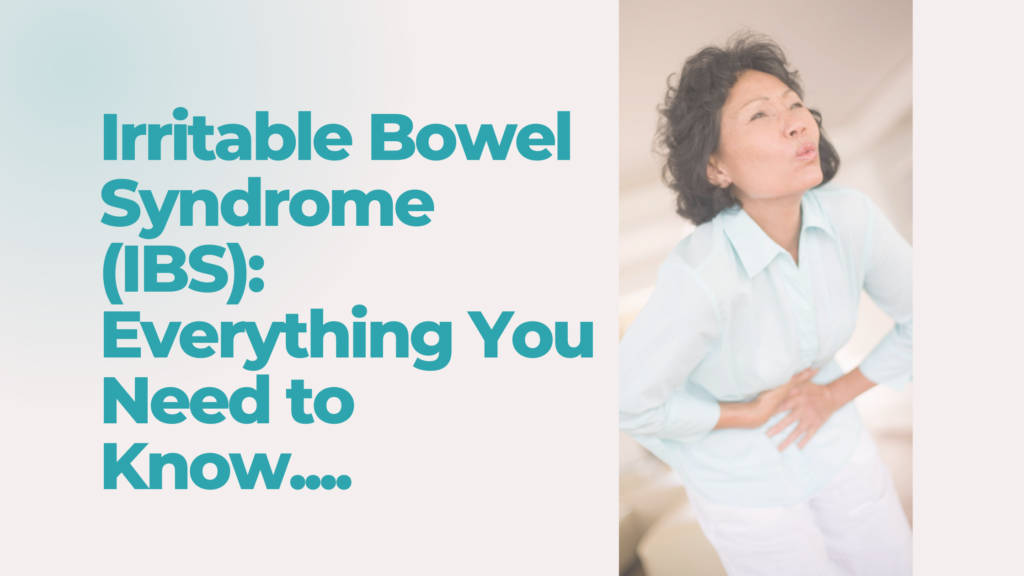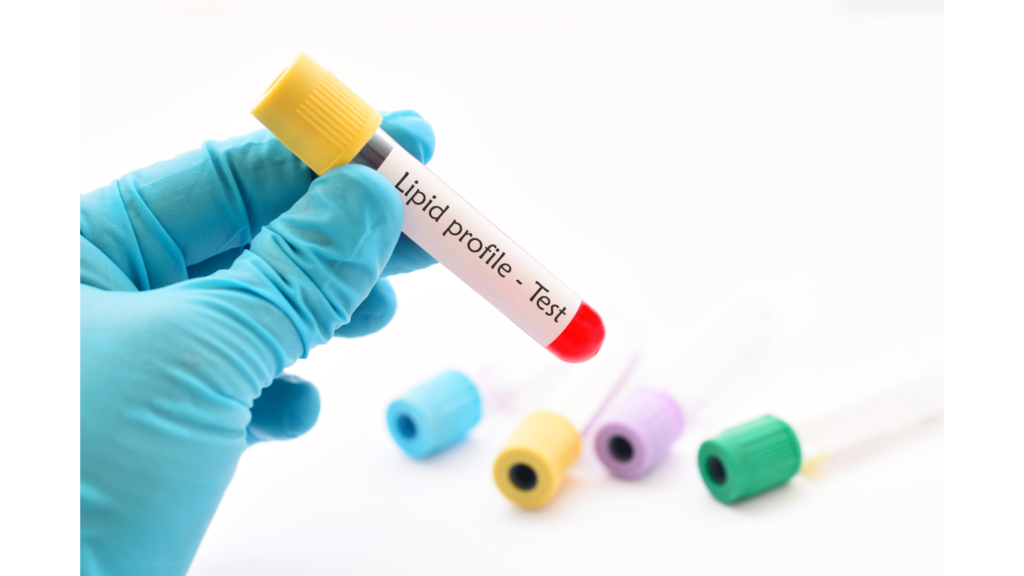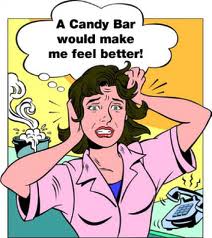PMS Top 10 food tips to reduce symptoms

Up to 75% of women will experience premenstrual syndrome (PMS) at some point in their reproductive years. Symptoms of PMS include mood swings, exhaustion, bloating, and cravings. As a specialised dietitian, I have personally witnessed the transformative power of nutrition in lowering PMS symptoms and enhancing quality of life.
It is commonly believed that avoiding foods and drinks like fat, chocolate, processed sugars, caffeine, fizzy minerals, and alcohol can make symptoms worse for those who consume them. Depending on your symptoms, health, and dietary habits, this may be beneficial. However, did you know that there are a variety of foods that are simple to include in your diet? These foods are not only perfect for people with PMS, but everyone can benefit from them!
Irritable Bowel Syndrome (IBS)- everything you need to know..

Struggling with bloating, cramps, or unpredictable bowels? You might be one of the millions affected by Irritable Bowel Syndrome (IBS). In this blog, expert Dietitian Gillian Killiner explains the causes, symptoms, and evidence-based strategies to manage IBS — including how personalised nutrition and lifestyle changes can help you take control of your gut health.
How to Lose Weight for Good

Effective Fat Loss Tips and Advice Introduction Hey everyone, this is the month to lose weight if you need and can! Yes you heard it! I have written about this countless times in blogs, magazines, papers and spoken on YouTube so apologies if you have heard this before, but I feel the New Year is not always the best time to embark on weight loss. It is a time of post stress, irratic blood sugars, low mood, no money, poor light, cold…. The time you want to stay warm and de-stress and nourish yourself physically and mentally. I strongly encourage after the summer months to refocus and commence a positve change. Did you know It takes 21 days to embed a new routine. How many embark on numerous weight loss journeys in January, only to find you are trapped in a cycle of losing and gaining weight, with little long-term success and give up by February. It’s a frustrating and disheartening experience that has I know left countless individuals feeling defeated. SO in this blog post, I aim to shed light on a different approach – one that is sustainable, enjoyable, and designed to help you lose weight for good. Do check out my YouTube Video on this very topic also. https://www.youtube.com/watch?v=nCXxQzxWpFs The Fear of Weight Loss I know many of you dread changing your diet to lose weight because you associate it with tasteless, unappetizing food? Others start a new diet regimen every morning, only to feel like a failure by bedtime. If this resonates with you you are not alone in these feelings. Many people have good intentions when it comes to weight loss, but they often encounter challenges that prevent them from achieving lasting results. The key is to recognize that weight loss doesn’t have to be a daunting experience; it can be a manageable and enjoyable part of your life and when you get it right, it should be flexible to work with you for good. The Pitfalls of Counting Calories and Macros to Lose Weight One common misconception about weight loss is the need to meticulously count calories and macros (macronutrients like protein, fat, and carbohydrates). While it’s essential to have a general understanding of your dietary intake, obsessively tracking these values is neither required nor sustainable in the long term. Constant monitoring can lead to frustration and dissatisfaction, taking away from the joy of eating and making it feel like a never-ending journey. Weight management should be a lifelong commitment, not a short-lived obsession. Learning takes time and so does long term successful weight loss. Commercial Weight Loss Programs – Do They Work? Commercial weight loss programs/products have their place in the industry and may yield short-term success for some individuals who are at high risk to get them to a safe place. However, for those who really don’t need them, they can trap you in a cycle of dependency on their products and quick fix guidance. Over time, this reliance can lead to a bigh expense and if not teaching you about real food will still ensure you have a lack of understanding over dietary choices -perfect for making it more confusing and leave you with no control. The initial results with any diet change can give results, but if extreme they can be very hard to maintain without supervision. We see this time and time again here at 121 Dietitian, many people come to us having regained the weight they lost and more and no idea what to do next. It’s essential to explore alternative approaches that empower you to take control of your health. Yo-Yo dieting is a NO-NO. Preparing for a Sustainable Weight Loss Journey Before embarking on a weight loss journey, it’s crucial to prepare yourself mentally and practically. Avoid falling into the trap of quick-fix solutions, as they often result in muscle loss and metabolic slowdown. Instead, set aside at least two months of your life when you can fully commit to changing your eating habits and lifestyle. This period should be free from major life changes like moving, changing jobs, or planning significant events like weddings. Sustainable weight loss requires a gradual, thoughtful approach and Autumn can be one of those perfect times. Understanding the Factors Behind Obesity Weight management is not solely about controlling your appetite and calorie intake. Several factors contribute to obesity, including your environment, emotions, impulsiveness, and early life experiences. Your surroundings play a significant role in your dietary choices. In our workd today we have a toxic environment filled with temptation. Fast food and processed snacks can lead to unhealthy habits, while a supportive environment can foster better choices. Our programmes guide you through the various trigger areas to tackle and allow you to get to a sustainable place without feeling one bit deprived. Expanding Your Food Choices to Lose Weight In a world with an abundance of food options, it’s still easy to fall into a routine of repetitive, restricted eating. Many individuals unknowingly limit their choices to a narrow range of foods, often favouring processed, unhealthy options. You may be surprised to learn that this could be becuase your gut bacteria is in control!! It’s essential therefore to broaden your palate and embrace a diverse range of nutritious foods. Start by making a list of your likes and dislikes, and identify areas where you can incorporate healthier alternatives or develop a taste for nutritious options. We would love to help you with that. Keeping a Food Diary Maintaining a food diary can be a valuable tool on your weight loss journey. In addition to documenting your meals, include details about your activities, sleep patterns, mood, and energy levels. A comprehensive diary helps you gain insight into your eating habits and their impact on your overall well-being. It serves as a mirror, reflecting your daily routine, making it easier to identify areas for improvement. You can complete a 7 day food diary and submit this alongside our questionnaire, this is
Cholesterol: Dispelling the Myth and Unveiling the True Culprits of Poor Heart Health

For decades, cholesterol has been portrayed as the bad guy behind heart disease and poor health. However, it has also been known for many years that cholesterol and especially consuming cholesterol foods are not the true culprit. As a dietitian committed to promoting natural foods and supplements for optimal health, it is essential to explore the link between blood cholesterol, high-sugar diets, and processed seed oils among other contributing factors. This blog hopes to provide some debunking around the cholesterol myth and highlight the true contributors to heart disease and overall well-being. Understanding Cholesterol Cholesterol is a crucial substance that plays a vital role in various bodily functions. While it often gets a bad reputation, it is important to understand that cholesterol is essential for our overall health. Our liver is primarily responsible for producing the cholesterol needed by our body, while a smaller amount is obtained through the foods we eat. One genetic condition, Familial Hypercholesterolaemia (FH), is where there is a fault in one of the genes involved in removing cholesterol from the blood via your liver. It happens when you inherit a ‘faulty’ gene (also known as an ‘alteration’ or ‘mutation’) from one of your parents. Many people go instantly to a no fat diet and this is not the answer. Using a healthy diet with select medication is required still ensuring healthy fats are not completely avoided. The Flawed Cholesterol-Heart Disease Connection Numerous studies have questioned the long-held belief that consuming foods high in cholesterol directly leads to elevated blood cholesterol levels and an increased risk of heart disease. Research is shedding more and more light on this topic, suggesting that the impact of dietary cholesterol on blood cholesterol levels may be minimal when compared to other factors such as overall diet quality and lifestyle choices. This has implications for individuals looking to make informed decisions about their dietary choices and overall cardiovascular health and I am so delighted to see this out-dated belief being challenged. Cholesterol – Focus on the Real Culprits Heart disease and poor health are complex issues cannot be solely due to one factor, such as cholesterol. Rather than singling out cholesterol, it is important to address the role of other factors that are involved. These include the well-known like lack of exercise, unbalanced diet, obesity, stress, lack of sleep, alcohol, smoking, and others not so obvious like trans fats, medications, diabetes, hormone dyregulation, an underactive thyroid, poor kidney function. The two primary factors I wish to expand on in this blog are high-sugar diets and processed seed oils. Both of which are unnecessary but deeply ingrained in our eating habits worldwide and are related to heart disease and poor heart health when consumed in the modern diet. High-Sugar Diets and Heart Disease A high intake of added sugars, particularly refined sugars found in ultra-processed and processed foods and sugary beverages, leads to chronic inflammation and oxidative stress in the body. Dietary sugars mainly refer to fructose and glucose which are naturally present in fruits and some vegetables. The molecular formula you may remember from school biology is C6H12O6 and they are isomers of each other. Fructose and glucose are both considered to be sweet sugars, fructose is however the sweeter of the two but here is the important part – fructose is absorbed differently in the body. Unlike glucose, which is used by cells as an energy source, fructose is metabolized by the liver, where it promotes the synthesis of fat. High Fructose Corn Syrup (HFCS) is a common sweetener and preservative made from the simple sugars fructose and glucose. HCFS-55 and HCFS-42, are the most commonly utilized form that are used in beverages and baked goods. As you can gusess the numbers indicate the amounts so HCFS -55 contains 55% fructose and HCFS-42 and 42% fructose, respectively, with the remainder of the of the syrup being glucose. Since the 1970s, the amount of HFCS has increased in foods firstly in the USA but are now common within the “Western diet” consumed worldwide. The consumption of these types of processed sugars, particularly in sugary soft beverages (SSB), became a major contributor to sugar intake, and the correlation between sugar-sweetened beverages (SSB) and cardiometabolic diseases highlights the potential impact of fructose and glucose on our health. Cholesterol intake or Triglyceride Imbalances? So why worry? Well increased sugar consumption stimulates the liver to convert excess sugar into triglycerides, a type of fat, and it is elevated triglyceride levels in the blood that are strongly associated with an increased risk of heart disease. As highlighted the consumption of processed sugar has reached worrying levels in our modern diet and I see this in my everyday practice. Patients are providing food diaries doing their best to eat what they consider healthy for their heart; all low fat, and in fact they are more inflamed than ever with not paying attention to the processed sugars they are consuming. While natural sugar can provide a quick burst of energy and is fine as part of a balanced intake, excessive intake can have detrimental effects on our health. As mentioned elevated levels of triglycerides in the blood have been identified as a significant risk factor for heart disease. When triglyceride levels rise above normal limits, it can lead to plaque buildup in the arteries, increasing the chances of heart disease and related complications. I explain and teach this to my patients. It is crucial for individuals to monitor and decrease their sugar intake, they are also required to check blood levels and maintain healthy triglyceride levels, this will reduce their risk of heart disease and other inflammatory conditions. Processed Seed Oils and Heart Disease So what about seed oils? The imbalance of omega-6 and omega-3 fatty acids is a common dietary concern. Omega-6 and omega-3 fatty acids are both essential fats that our bodies need for various functions, such as proper brain function, healthy skin, and the regulation of inflammation. However, in today’s Western diet, the ratio
Aspartame: Insights from a Specialist Dietitian

Aspartame what is all the fuss about? As a dietitian with over two and a half decades of experience, I have always prioritized the well-being of my clients and promoted a balanced, healthy diet for each individuals needs, health, likes and dislikes etc. Throughout my career, I have encountered numerous questions about artificial sweeteners, particularly aspartame. In this blog, I would like to share my perspective on aspartame and explain why I prefer to steer clear of artificial sweeteners. What is Aspartame? Aspartame is an artificial sweetener that has been widely used as a sugar substitute in various food and beverage products. It is found in many sugar-free or “diet” options, such as soft drinks, chewing gum, and desserts. Aspartame is a synthetic substance that combines two ingredients: 1. Aspartic acid. This is a nonessential amino acid that occurs naturally in the human body and in food. Amino acids are the building blocks of protein in the body. The body uses aspartic acid to create hormones and to support normal function of the nervous system. Dietary sources include meat, fish, eggs, soybeans, and peanuts. 2. Phenylalanine. This is an essential amino acid that’s naturally present in most protein sources, but the body doesn’t produce it naturally. Humans have to get it from food. The body uses it to make proteins, brain chemicals, and hormones. Sources include lean meats, dairy products, nuts, and seeds. Combining these two ingredients creates a product that is about 200 times as sweet as regular sugar. A small amount can make food taste very sweet. It also provides very few calories. While aspartame is approved for use by regulatory authorities in many countries, its safety and health effects have been a topic of debate and scrutiny. The World Health Organization (WHO) has recently issued a new guideline regarding non-sugar sweeteners (NSS). According to this guideline, the use of NSS is not recommended for weight management or as a means to lower the risk of noncommunicable diseases (NCDs). Based on a thorough review of the available evidence, it has been found that (NSS) do not offer any long-term benefits when it comes to reducing body fat in both adults and children. The review’s findings indicate that prolonged use of NSS may have unintended consequences, including a higher likelihood of developing type 2 diabetes, cardiovascular diseases, and increased mortality rates among adults. Replacing free sugars with non-sugar sweeteners (NSS) may not be effective in achieving long-term weight control. According to Francesco Branca, WHO Director for Nutrition and Food Safety, it is important for individuals to explore alternative methods of reducing their consumption of free sugars. This can include opting for food options that naturally contain sugars, such as fruits, or choosing unsweetened food and beverages. Non-nutritive sweeteners (NSS) are not considered necessary for a balanced diet and do not contribute any significant nutritional value. It is recommended that individuals reduce their overall intake of sweeteners from an early age in order to enhance their overall health and well-being. (WHO 2023) Why I suggest avoidance of Aspartame and others Conclusion: After practicing as a dietitian for 26 years, I have witnessed time and time again patents coming to me with the highest intakes of artificial sweeteners struggling the most with their diet, weight, physical and mental health. Once they start to follow one of my programmes these problems are quickly resolved. (if interested do check out my google and facebook reviews) I am glad I have not wavered when others have challenged me and I have stood by my decision to not recommend artificial sweeteners, including aspartame. While aspartame may be deemed safe for consumption within approved limits, why risk it. We need more ‘high’-quality research to further assess these relationships. I will continue to educate people to prioritize a whole-food, nutrient-dense approach to healthy eating. By choosing natural alternatives and educating clients about the importance of mindful eating and moderation, I believe we can foster a healthier relationship with food that supports long-term well-being. So, what to do next or for anything else.. If you are needing help with your diet and health or anything else… we can assist you with this. Maybe you wish to change your eating habits, stop tracking or need help optimising the foods you eat to assist your mental health or your gut symptoms and are not sure what programme to select, please do contact us. We would love to help you or your family and friends with any nutrition-related queries big or small. If you want to book your programme TODAY we would love to help you. You can book a 121 Dietitian Programme today by clicking on the link below If you have enjoyed this blog we would love you to share this with your family and friends on your social media channels. Do visit our YouTube Channel for more on keeping your health optimal. If you are interested in how I overcame my Thyroid Autoimmune Condition do check out the About section below Before you go please check out our 121 Dietitian Shop created specifically for optimising your health. Gillian x
Manage Stress to Better Manage Irritable Bowel Syndrome (IBS)

What is Irritable Bowel Syndrom (IBS) and How Does Stress Impact It? Irritable Bowel Syndrome (IBS) is a common disorder of the gastrointestinal tract that affects an estimated 10-15% of people worldwide. Stress has been identified as a major factor in the onset and exacerbation of IBS symptoms and it is definitely a trigger for the patients I see at my clinic when attending one of our super successful gut health programmes. This month has been awareness month for both IBS and Stress, so I thought I would bring the two together in my final blog for this month. As previously mentioned in my previous blogs IBS and Probiotics Irritable Bowel Syndrome is characterized by abdominal pain, bloating, and changes in bowel habits. How does stress affect digestion? Studies have shown that stress can affect the way our bodies process food and how our digestive system functions, leading to an increase in abdominal pain and other IBS symptoms. Additionally, stress can cause changes in hormone levels which can further exacerbate IBS symptoms. It is important for people with IBS to take steps to reduce stress levels in order to manage their condition more effectively. The relationship between our brains and the digestive system is powerful, so it is not uncommon for changes in our emotional or psychological state to affect the way our gut works and could explain why we often feel ‘butterflies in the stomach’ when feeling anxious or stressed. The communication and feedback between the gut and the brain is known as the gut-brain axis. This network consists of two parts: The sympathetic nervous system, which manages fight-or-flight responses; and the parasympathetic nervous system, which controls repair, rest and digestion. It is believed that the enteric system functions as a third part to control the digestive system. This communication between the brain and the gut is referred to as ‘the gut-brain axis’, which helps connect emotional processes in the brain to the physical operations of our digestive system. Recent research has been able to establish the gut-brain axis, which is the connection between the two systems. Emotions can affect how your gut functions and vice versa. It’s important to note that although many digestive problems are related to mental health, not all of them are caused by Irritable Bowel Syndrome (IBS). Anxiety can manifest in various physical symptoms, such as stomach aches or changes in bowel movements. Gut Bacteria and Stress Did you know that having an imbalance in your gut bacteria is having an impact on your mental health? This is sadly not that well known, but with years of research and practice it is a major area that I have built into our programmes and is an important part of successful treatment. Certain bacteria can affect levels of anxiety or stress through activities in the digestive tract. A healthy balance of the ecosystem is necessary for our mental health and well-being, however when it is not balanced (dysbiosis) organisms like bacteria can lead to negative consequences. A recent large, most comprehensive and best-validated association study to date provides further evidence for an association between gut microbes and blood metabolites (generated by host and by microbes) in patients with Major depressive disorder (MDD). (1) They observed “that the genera Sellimonas, Eggerthella, Hungatella, and Lachnoclostridium were more abundant, while genera Ruminococcaceae…, Coprococcus, Lachnospiraceae…, Eubacterium ventriosum, Subdoligranulum, and family Ruminococcaceae were depleted in the guts of individuals with more symptoms of depression. Of these, genus Eggerthella showed statistical evidence of being involved in the causal pathway.” These microbes are involved in synthesising important neurotransmitters, such as gamma-aminobutyric acid, butyrate, glutamate, and serotonin. It is known that Butyrate can influence depression through several routes — ie, via immune regulation, genomic transcript/translation, and/or affecting energy metabolism. So this is really critical for health to ensure these pathways are optimised. 3 Tips for Identifying & Reducing Sources of Stress in Your Life Stress is a natural part of life and we all deal with it at different times in our day, week or life. It is normal and should not cause us problems. It can however become overwhelming if left unchecked. Identifying and reducing sources of stress in your life is essential for maintaining mental and physical health. There are many levels of stress and many ways to address. Here are 3 simple tips to help you identify and reduce the sources of stress in your life. One way is to take time to reflect on what is causing you stress. This could be anything from work or family pressures to financial concerns or relationship issues. Once you’ve identified the source, think about how you can reduce it. This could involve making lifestyle changes. Such as exercising more or taking up a hobby, or seeking professional help if needed. Second, get into the habit of practising mindful living by being aware of how your thoughts and actions affect your emotions and overall well-being. Taking regular breaks throughout the day to relax and refocus will help keep stress levels low. Third, set realistic goals for yourself that are achievable within a reasonable timeframe. Setting unrealistic expectations will only add more pressure and increase feelings of helplessness. Dietary Changes & Supplements that Can Help with Stress & IBS Symptoms Making changes to your diet can not only help reduce stress levels but also lessen the severity of IBS symptoms. Eating a nutrient-rich diet, and limiting processed fat and sugars is important as well as avoiding specific trigger foods. These can help reduce stress levels and improve digestion. Our 6 week elimination programme combines these all for excellent results. Additionally, certain supplements such as probiotics, omega-3 fatty acids, magnesium, vitamin B12 and zinc may be beneficial for those suffering from stress or IBS. By making key dietary changes and taking the right supplements specifically for you, you can experience improved overall health and well-being. We do a deep dive assessment for each patient that attends our practice. This allows 121 Dietitian programmes to be designed specifically for you, ensuring physical and mental health are addressed. Stress Management